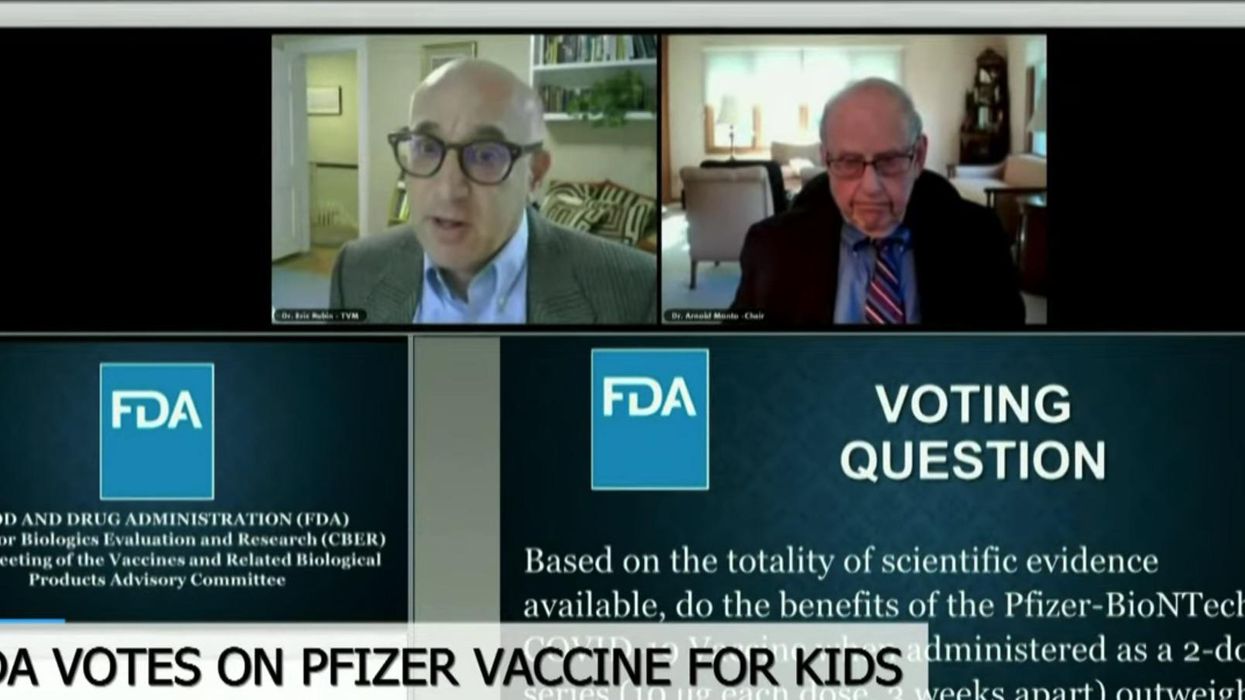
Image source: YouTube screenshot

Dr. Eric Rubin, who sits on the Food and Drug Administration independent advisory panel, justified recommending the Pfizer COVID vaccine for young children Tuesday by deferring to potential upsides despite unknown side effects.
Nearly one year after the government approved the Pfizer COVID-19 vaccines for adults, an FDA advisory panel recommended — by a vote of 17-0, with one abstention — granting emergency authorization of the Pfizer vaccine for children ages 5 to 11.
As the Washington Post noted, the advisory board's advice is nonbinding. However, the FDA is certain to grant emergency authorization.
Next, the Centers for Disease Control and Prevention will have to authorize vaccinating children. Once CDC Director Dr. Rochelle Walensky gives approval, which may come as soon as next week, young children can begin receiving the Pfizer vaccine.
Child recipients will receive one-third the dose given to adults.
Before the vote, panel members presented their opinions and concerns about giving the COVID vaccine to children.
Despite the unknown, Rubin — a physician at Boston's Brigham and Women's Hospital and immunology professor at the Harvard T.H. Chan School of Public Health — said the vaccine should be approved for children. Many other experts on the panel voiced similar opinions.
"The data show that the vaccine works and is pretty safe ... and yet we're worried about a side effect that we can't measure yet, but it's probably real," Rubin said.
"What sways me here is that it's a very, sort of, personal choice. If I had a child who was a transplant recipient, I would really want to be able to use a vaccine like this. And there are certainly kids who probably should be vaccinated," he explained. "The question of how broadly we use it, though, I think is a substantial one. I know it's not our question ... but I do think that it's a relatively close call."
In fact, according to Rubin, the vaccine should be approved in spite of the unknown, for administering the vaccine is the only way possible to learn of potential side effects.
"It really is going to be a question of what the prevailing conditions are," Rubin said. "But we're never going to learn about how safe this vaccine is unless we start giving it. That's just the way it goes."
"That's how we found out about rare complications of other vaccines," he added. "And I do think that we should vote to approve it."
FDA votes on approval of the Pfizer vaccine for children aged 5-11 | USA Todayyoutu.be
Interestingly, the panel member who abstained from voting — Michael Kurilla, an infectious diseases expert at the National Institutes of Health — said kids who have contracted COVID-19 in the past may not need the vaccine.
"There are high-risk individuals, and I think they do need to be attended to. We do need to provide a vaccine for them," Kurilla said. "But for many others, one dose or no dose, even. If they've had prior COVID infection, they may not need anything more."